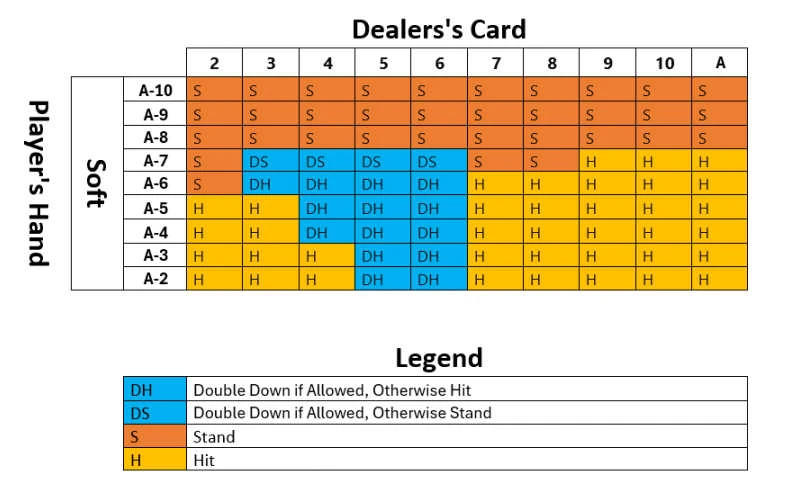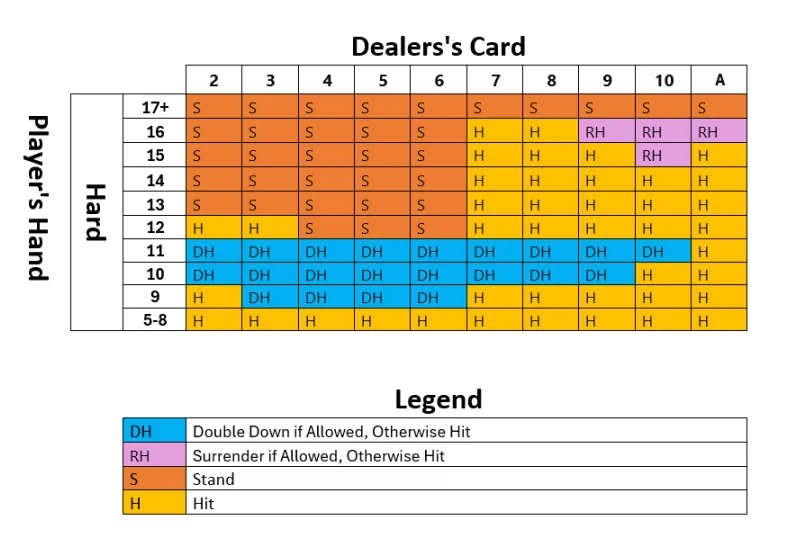
Hard Hand vs Soft Hand in Blackjack What Is The Difference?
Blackjack is a game of strategy, not just about reaching 21. Each hand dealt has its own significance, and the decisions you make are shaped by whether your hand is hard or soft. The type of hand directly influences your gameplay, dictating when to hit, stand, or double down. Therefore, mastering the basic rules of the game and understanding your hand type are crucial to improving your overall strategy and results.
In this guide, we’ll break down the differences between hard hands and soft hands. By understanding these distinctions and applying the appropriate strategies, you’ll be able to make more informed decisions. Knowing whether your hand is flexible (soft) or fixed (hard) will give you an edge, improving your chances of winning in both casual and competitive blackjack settings.
Definition of a Hand in Blackjack
Blackjack is based on two initial cards that set the stage for the entire round. Understanding how the value of these cards works is key to making smart decisions as you play.
What Is a Hand in Blackjack?
A hand in blackjack consists of two cards initially dealt to the player. These two cards form the basis for all future moves, including hitting, standing, or doubling down.
The total value of your hand is determined by the following:
- Number cards (2-10) are worth their face value.
- Face cards (King, Queen, Jack) are all worth 10 points each.
- The Ace is unique because it can be worth either 1 or 11, depending on what benefits the player most.
Types of Hands
- Soft Hand: Any hand containing an Ace that can be valued as either 1 or 11, providing flexibility.
- Hard Hand: A hand with no Ace or where the Ace must be valued as 1 to avoid busting.
Why It Matters
- Hard hands are more rigid, meaning players need to be cautious as they are more likely to bust when taking additional cards.
- Soft hands offer more flexibility and allow for riskier plays without the immediate danger of going over 21, giving players a strategic advantage. Understanding this distinction is vital for optimal decision-making during the game.
What Is a Soft Hand in Blackjack?
In blackjack, a soft hand provides a unique advantage due to the flexibility it offers. This section explains what constitutes a soft hand and how best to play it.
- Definition: A soft hand in blackjack is any hand that includes an Ace, where the Ace can be valued as either 1 or 11. This gives players significant flexibility in their decisions, as the value of the hand can change depending on what is most advantageous. For example, a hand with an Ace and a 6 can be counted as either 7 or 17.
Examples of Soft Hands
- Soft 13: Ace + 2
- Soft 17: Ace + 6
- Soft 19: Ace + 8
Strategy for Playing Soft Hands
The principles you need to understand how to play a soft hand :
- Hitting on Soft Hands : Since a soft hand cannot bust with one additional card (thanks to the Ace’s flexibility), hitting is often the best move for soft hands with totals between 13-16. For example, if you have Soft 16 (Ace + 5), you can safely hit to improve your hand without the immediate risk of going over 21.
- Doubling Down: Soft hands are excellent candidates for doubling down, especially when the dealer shows a weak card like 4, 5, or 6. For example, Soft 17 (Ace + 6) offers a great opportunity to double down because the Ace reduces the risk of busting.
- Standing on Soft Hands: With hands like Soft 18 or higher, standing is often the best option because these hands are already strong. For instance, Soft 19 (Ace + 8) should generally stand unless the dealer is showing an Ace or 10, where the risk to the player increases.
Soft Hand Blackjack Chart
The chart below outlines the basic strategy for playing different soft hands, based on the dealer’s upcard.

See our dedicated article for more blackjack charts.
What Is a Hard Hand in Blackjack?
A hard hand in blackjack is one that is more rigid and prone to busting. It lacks the flexibility of a soft hand, making strategic decisions more crucial.
- Definition: A hard hand does not contain an Ace, or if it does, the Ace must be counted as 1 to prevent going over 21. Hard hands offer less flexibility than soft hands, which increases the risk of busting when drawing additional cards. These are often weaker hands than soft ones.
Examples of Hard Hands:
- Hard 14: 10 + 4
- Hard 16: 9 + 7
- Hard 19: Ace + 8 (with the Ace counted as 1)
Strategy for Playing Hard Hands
The principles you need to understand how to play a hard hand :
- Hitting vs. Standing: For hard hands like 12-16, players should be cautious. If the dealer shows a high card (7 or higher), hitting is usually necessary despite the risk of busting, as standing offers low winning chances. Conversely, if the dealer shows a weak card (2-6), standing is generally safer, banking on the dealer busting.
- Doubling Down: Hard hands like hard 9, 10, or 11 can be good opportunities for doubling down, especially if the dealer has a weak card. However, the risk is higher than with soft hands since you’re closer to busting if a high card is drawn.
Hard Hand Blackjack Chart
The chart below outlines the basic strategy for playing different hard hands, based on the dealer’s upcard.

See our dedicated article for more blackjack charts.
Are Soft Hands More Common than Hard Hands?
In blackjack, the frequency of soft and hard hands can impact your strategy and overall odds of winning. Understanding which types of hands occur more frequently helps players anticipate their likelihood of drawing either type.
Frequency of Hard and Soft Hands
- Hard hands are significantly more common than soft hands because the majority of cards in the deck are non-Ace cards. This leads to more frequent hard totals.
- Soft hands, while rarer, offer more strategic flexibility due to the Ace’s dual value (1 or 11). This flexibility often makes soft hands more favorable in specific situations, allowing players to avoid busting and make riskier moves when needed.
Probabilities of Hard and Soft Hands
- A soft hand occurs when an ace can count as 11. The chances of being dealt an ace in the first two cards are about 15.3% in a single deck and 15.6% in a six-deck game. Soft hands are less common since not all ace combinations remain soft.
- Hard hands are more frequent, making up around 84.7% of hands in a single-deck game and 84.4% in a six-deck game. They include hands without an ace or those where the ace counts as 1 to prevent busting.
Table: Hard vs. Soft Hands
When comparing hard and soft hands in blackjack, it's important to understand how each type of hand should be played based on the dealer's upcard. The table below provides a clear comparison of hard and soft hands, along with the best strategic move for different dealer upcards.
|
Hand Type
|
Hand
|
Example Hand
|
Best Move
|
|---|---|---|---|
|
Hard
|
17+
|
9 + 8 |
Stand
|
|
Hard
|
16
|
10 + 6 |
Stand (if dealer shows 2-6), otherwise hit
|
|
Hard
|
15
|
7 + 8 |
Hit
|
|
Hard
|
14
|
8 + 6 |
Hit
|
|
Hard
|
13
|
9 + 4 |
Hit
|
|
Hard
|
12
|
10 + 2
|
Hit
|
|
Hard
|
11
|
7 + 4 |
Double Down
|
|
Hard
|
10
|
4 + 6 |
Double Down
|
|
Hard
|
9
|
6 + 3 |
Double Down
|
|
Hard
|
5-8 |
3 + 2 |
Hit
|
|
Soft
|
A-10
|
Ace + 10
|
Stand
|
|
Soft
|
A-9
|
Ace + 9
|
Stand
|
|
Soft
|
A-8
|
Ace + 8
|
Stand
|
|
Soft
|
A-7
|
Ace + 7
|
Double Down (if dealer shows 2-6), otherwise Stand
|
|
Soft
|
A-6
|
Ace + 6
|
Double Down
|
|
Soft
|
A-5
|
Ace + 5
|
Hit or Double Down
|
|
Soft
|
A-4
|
Ace + 4
|
Hit
|
|
Soft
|
A-3
|
Ace + 3
|
Hit
|
|
Soft
|
A-2
|
Ace + 2
|
Hit
|
Final advice and tips
Understanding the difference between hard and soft hands is essential for optimizing your blackjack strategy. Knowing when to hit, stand, or double down depends on whether you hold a hard or soft hand, and your actions should always take the dealer’s upcard into account.
By practicing the correct strategies for each type of hand, players can reduce the house edge and greatly improve their long-term results. Mastering these basics will give you the confidence to make smarter decisions at the table, enhancing your overall gameplay.

Author
Content Writer